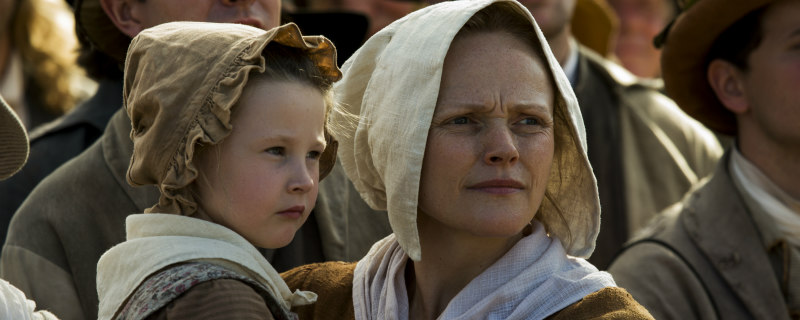
Review by Eric Hillis
Directed by: Mike Leigh
Starring: Rory Kinnear, Maxine Peake, Neil Bell, Pearce Quigley, David Moorst

Mike Leigh has made movies with wider audience appeal in the past, but none of his prior films feel as influenced by mainstream commercial filmmaking as his latest, Peterloo, which documents the 1819 massacre of civilians attending a political reform rally at Manchester's St. Peter's Field. Leigh borrows the template of the classic Hollywood disaster movie, introducing us to an ensemble of characters, many of whom will perish in the final act when tragedy strikes.
I'm torn on whether writer/director Leigh's film features too many or too few characters. The film certainly lacks that one central figure that might play the role of an audience surrogate, that one human face in the crowd that ultimately gathers on the fateful morning of August 16th, 1819. Initially we think it might come in the form of Nellie (Maxine Peake), a working class housewife whose son returns from the Napoleonic Wars ravaged by shellshock, and whose husband has begun attending meetings of Manchester's burgeoning labour movement. Nellie is on the fence regarding the growing surge for rights for the lower classes, inspired by the success of the French Revolution. She's cynical about the prospects of democracy being granted beyond the domain of landowners, and as a woman she's aware she probably won't be included in any reform regardless. For now she has more pressing concerns, like finding the next meal for her children.

This understanding of and empathy towards the real struggles of the working class is what separates Leigh from many of his peers and pretenders in the world of British social realism. Leigh doesn't push his film's political message to the forefront at the expense of its many (too many?) characters. Even the film's several extended passages of literal political grandstanding serve to flesh out the humans that populate this tale, and we learn their varying degrees of commitment and differing motivations while they verbalise their struggle.
A key figure is that of Henry Hunt (Rory Kinnear), a landed Southern gent who nonetheless has committed himself to using his influence to effect change in British society. At the same time, he's a bit of a snob, and Leigh mines much wry humour from Hunt's increasingly agitated interactions with the rough and tumble Northerners who rope him into speaking at their rally. The question of whether the pro-democracy movement should be willing to bear arms for their cause creates further tension between Hunt and his Mancunian brethren, leaving us to ponder what the outcome might have been if the protesters had been equipped to defend themselves from the sabres wielded by their attackers, drunken members of a government militia.

The motivations of said militia to enact such indiscriminate violence on men, women and children is never made clear here, and it might have served Leigh well to substitute one of his many reform movement figures for that of a soldier, to give us some context from the other side. The film's antagonist, the ruthless combined forces of church, state and industry, is represented by a quartet of toffs so lazily sketched that their generic RP-accented villainry would be more at home in a Star Wars movie or the sort of historical drama Mel Gibson might have once starred in.
Though it clocks in at two and a half hours, Peterloo never drags, and if anything it could have used another half hour to tie up loose ends. There are characters who are introduced in a manner that makes you believe they are set to play a major role, only for Leigh to seemingly forget he wrote them into the drama to begin with, and a subplot involving an opportunistic spy is so poorly rendered it makes some of the drama we witness seem contradictory.

Perhaps Leigh should have collaborated on the script with a writer more versed in threading such a complex narrative together, but as a director, Peterloo sees the veteran filmmaker on top form. He approaches the story in similar fashion to Spielberg with Schindler's List, injecting humour and levity into what is very much a tragic tale without his film ever coming off as tonally jarring. It's as blackly comic as Leigh's previous period offering, Mr Turner, and portrays the world of politics in similar fashion to his presentation of the art world, a mixed bag of those who are genuinely interested and those who approach it from an opportunistic stance.
The comedy grinds to a halt once the massacre itself begins, with Leigh depicting the event in a brutal manner that seems inspired by the depiction of the Sand Creek massacre in Ralph Nelson's incendiary 1970 western Soldier Blue. Unfortunately, the scene that immediately follows the massacre is laughable for all the wrong reasons, as a group of journos debate how to report the incident and come up with the movie's title in what has to be the most cringeworthy moment of Leigh's distinguished career.

Peterloo is in UK/ROI cinemas November 2nd.

